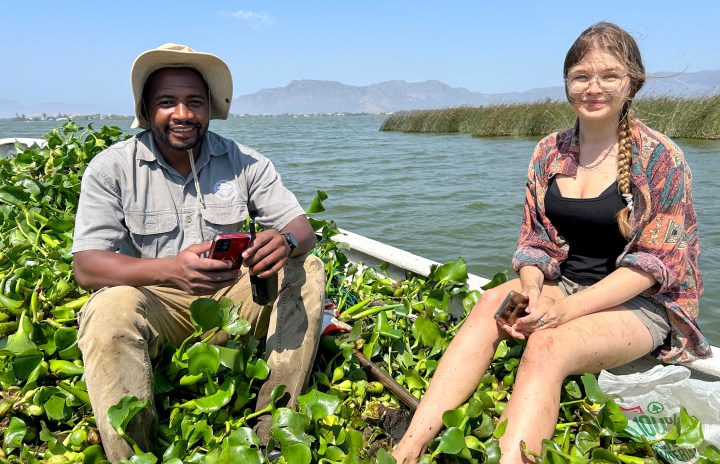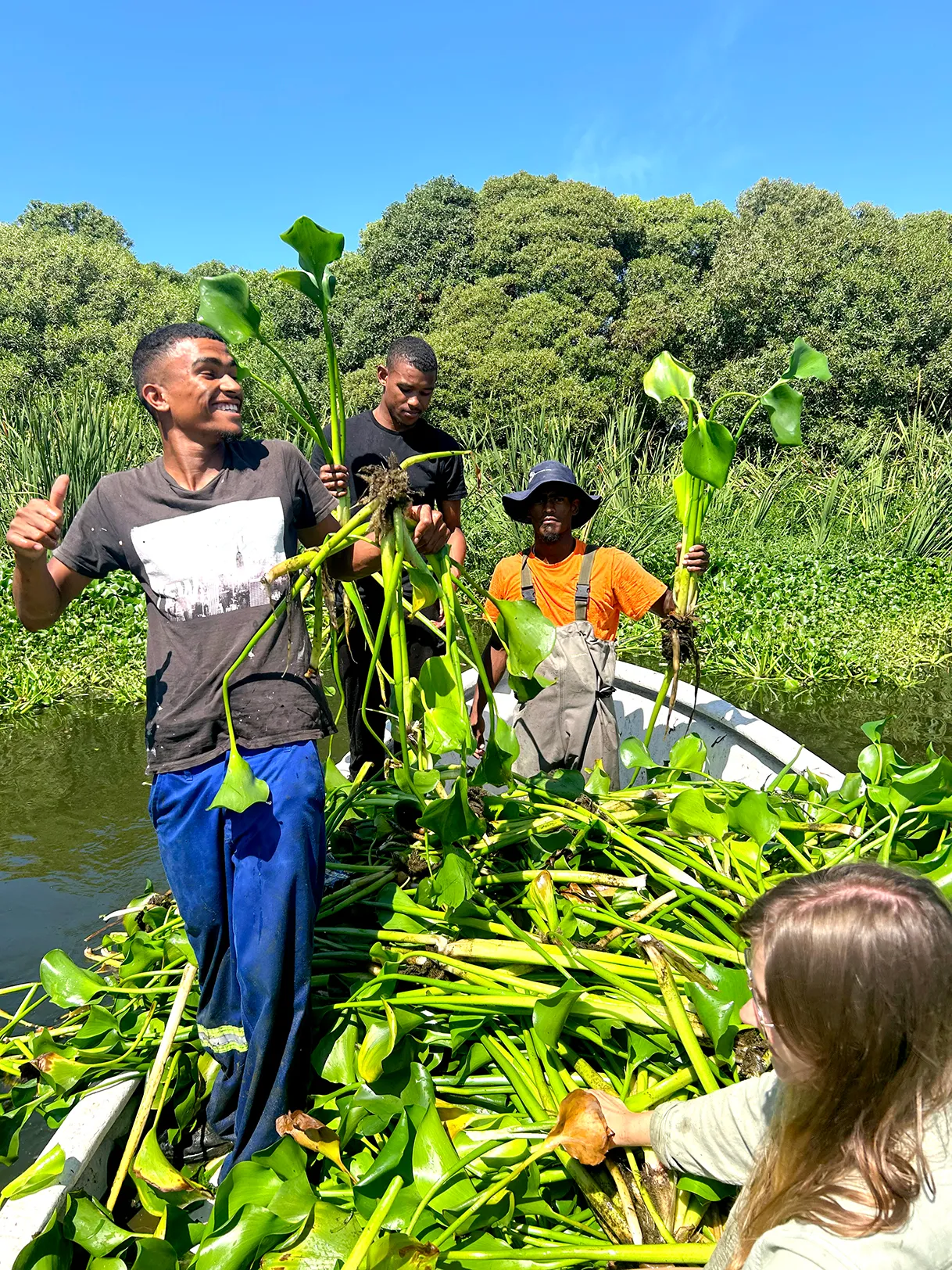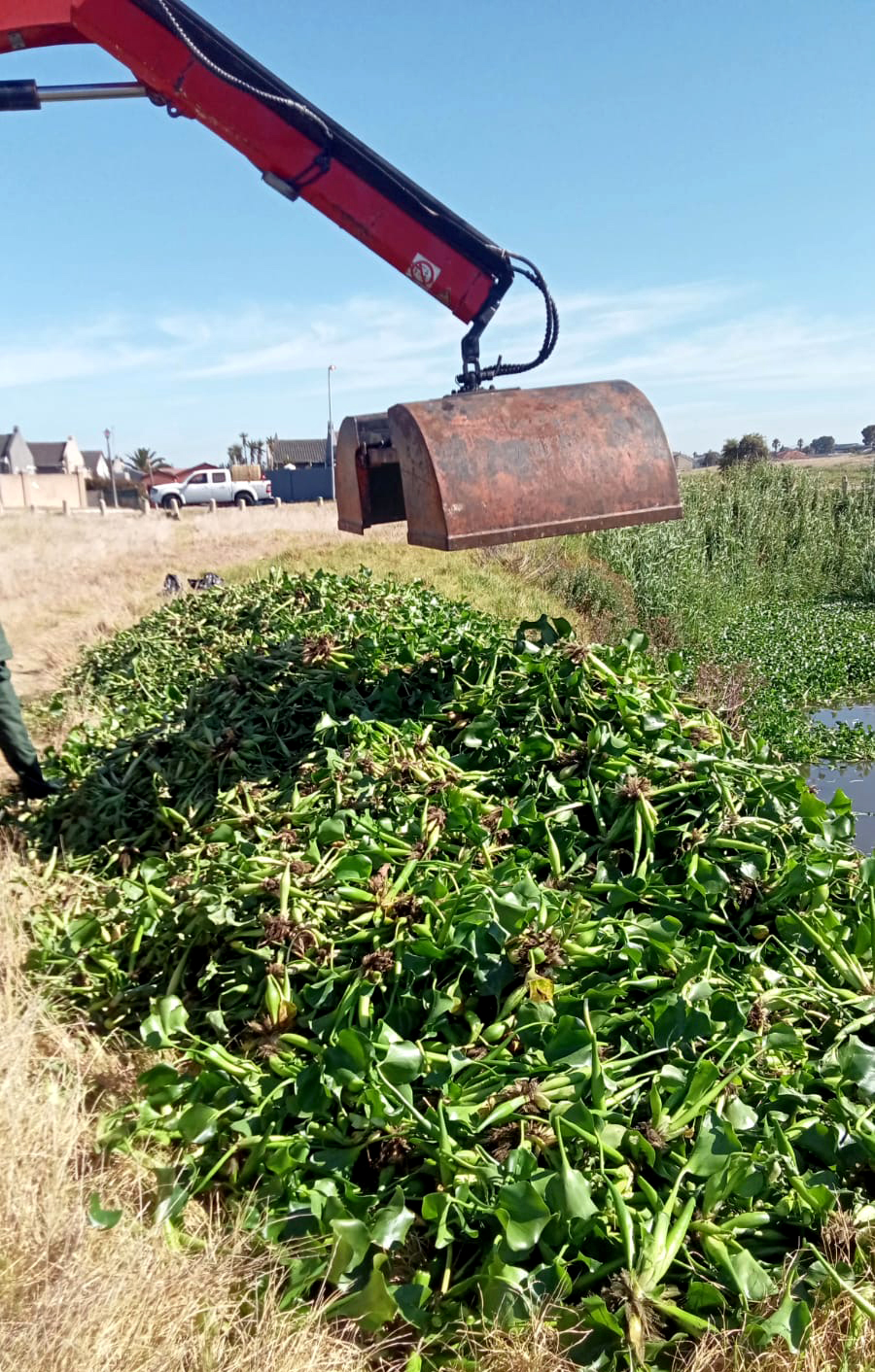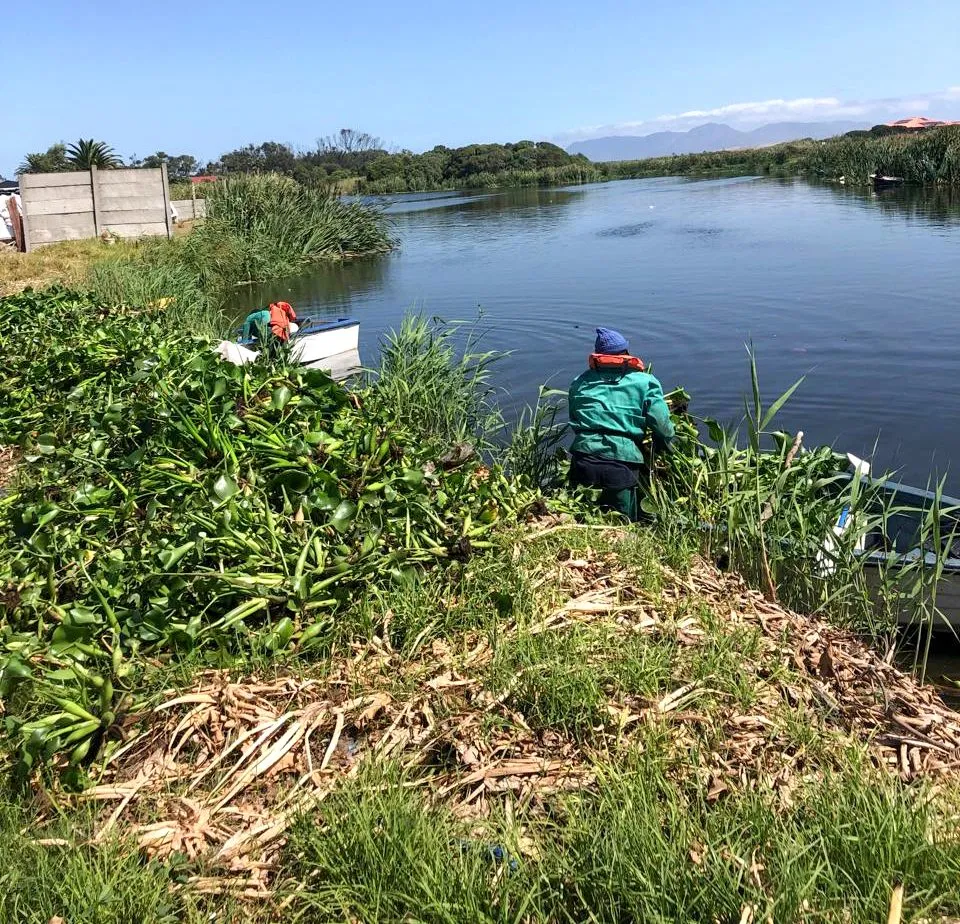ALIEN INVASION
Winning the war against the aggressive water hyacinth – A Cape Town community’s tireless effort

Facing a year-long battle against the world’s most aggressive aquatic weed, water hyacinth, the Zeekoevlei wetland in Cape Town emerges victorious.
For almost a year, one of Cape Town’s most renowned freshwater lakes, the Zeekoevlei wetland — a vibrant haven filled with life and the City of Cape Town’s first recognised Ramsar site of International Importance – faced off against an onslaught of water hyacinth.
Having managed to control the infestation, this week removal teams called a victory over hyacinth.
Water hyacinth in Zeekoevlei dates back to the 1950s, but the victory against the recent blooms has been attributed to the Friends of Zeekoevlei and Rondevlei (FOZR), the City of Cape Town, the city’s False Bay Nature Reserve, and community volunteers waging a war against the encroaching water lettuce and bringing a glimmer of hope in containing the invasive alien species.

Volunteers, the Friends of Zeekoevlei and Rondevlei and the City of Cape Town have worked relentlessly to clear the water hyacinth bloom in Zeekoevlei over the past year. (Photo: Friends of Zeekoevlei and Rondevlei)
As the Zeekoevlei section of the False Bay Nature Reserve is located at the bottom of the catchment, it receives the bulk of nutrients from higher catchment areas and it is this ingress of nutrients — coupled with load shedding challenges and sewage contamination – that fuelled the rapid growth of the species.
FOZR chairperson Sidney Jacobs and vice-chairperson Tom Schwerdtfeger told Daily Maverick that the water hyacinth infestation had finally been controlled in Zeekoevlei, but cautioned that it would be back and that in the meantime they would increase vigilance of the infected areas.
“Hyacinth has been found in Zeekoevlei since the 1950s. In the early 2000s, we had a big outbreak that covered around 20% of the 256ha waterbody.
“In recent years, with the onset of load shedding and the subsequent increase in raw sewage entering the catchment, the outbreaks are unfortunately more frequent and aggressive,” Schwerdtfeger said.
Jacobs added that they were encouraged by the amount of work that the city’s water and sanitation department was doing to repair and maintain their infrastructure, which would have positive outcomes in the future. However, load shedding remained their number one concern.
“The [city’s] water and sanitation department has to stop sewage from flowing into the river systems,” said Jacobs.
Collaborative efforts yield success
Amid the challenges, the spirit of resilience pervaded the Zeekoevlei community.
The False Bay Nature Reserve management and staff led the effort from the front dealing with the issue. Jacobs and Schwerdtfeger said that the city’s catchment, stormwater and river management departments assisted hugely by providing a long arm boom and amphibious earthmover which helped to remove a lot of the volume.
The FOZR green team, led by Jacobs, spent many days getting between the reeds and removing the small pieces that doubled in size about every six days. FOZR also organised community clean-ups and has had support from some of the clubs that use Zeekoevlei for recreational purposes.
“We raised R15,000 to pay for labour for the FOZR Green Team and we are grateful for the hard work and dedication that these guys put in,” Jacobs said.

A team works on clearing the water hyacinth bloom in the Zeekoevlei wetland in Cape Town. (Photo: Friends of Zeekoevlei and Rondevlei)
In the short term, Schwerdtfeger explained that hyacinth blocked the sunlight from the water, thereby suffocating and killing the ecosystem beneath it. He said that the temperature of the water rose, which in itself assisted the hyacinth to increase in volume faster.
“So the perfect storm situation develops for the hyacinth to take over.”
Eddie Andrews, the city’s deputy mayor and mayoral committee member for spatial planning and environment, said biocontrol for water hyacinth – as has been used in other cases around the country – did not thrive in the temperate climate of the Western Cape.
Read more in Daily Maverick: Rapid water lettuce spread threatens Vaal River — weevils could be the solution
This left the teams to undertake relentless manual removals from a boat, patrol the banks where access was possible, and employ the heavy machines in other sections of the vlei, specifically at the Big Lotus mouth.
Jacobs said, “Make no mistake, hyacinth will be back. In the meantime, we will increase our vigilance of the infected areas, work with False Bay Nature Reserve and deploy the green team when necessary to ensure that we stay on top of the problem. Prevention is better than cure — so we are engaging with the city to remove hyacinth upstream before it enters the Ramsar site

It’s been almost a year since a concerning bloom of water hyacinth, the world’s most invasive and harmful aquatic weed, was observed within the Zeekoevlei wetland in Cape Town. (Photo: Friends of Zeekoevlei and Rondevlei)
“It is better to throw all available resources at a hyacinth outbreak and spend R1m on eradicating it as quickly as possible, instead of spending R100k per month for 36 months,” he said.
Read more in Daily Maverick: Spraying of controversial herbicide on Vaal River water lettuce begins – critics urge caution
Jacobs said the latest outbreak was noticed by all parties between October and November 2023 and initial steps put in place stopped a rampant spread into the main body of the vlei.
False Bay Nature Reserve installed floating booms across the river mouths to minimise/stop the hyacinth from moving into the huge vlei, and fortunately, it worked.
Strategies for clearing the vlei
Andrews said water hyacinth was extremely difficult to eradicate, however, recent efforts had reduced the plant to manageable quantities.
“[It] can double its quantity in 14 days in ideal conditions. Accordingly, the city patrols the vlei weekly using a boat and at least four crew members and each and every small clump is removed immediately as and when detected,” he said.
Hailing from Capricorn Park, Hanleck, one of the workers contracted to clear the water hyacinth from Zeekoevlei who asked that only his first name be published, told Daily Maverick that the clearing was not difficult, but they had to be extremely careful and take the necessary time to do the job properly.
While the city has workers and excavators removing the invasive alien species, Hanleck and his team specialise in going into smaller rivers and between reeds to find the smaller plants that create problems later.
“We get taught all about the problems these plants cause and why they must be taken out so that the vlei does not suffer… You cannot miss any small plant that hides behind the other reeds… as we were taught that hyacinth can grow very fast and cover our water body. [This is] not good, but we find them [and] they cannot hide,” he said.
@alanjacobs307 #zeekoevlei #hyacinthcleanup #teamwork #capetowntiktok #CapCut ♬ Riders on the Storm – The Doors
There are concerns that the plant might bloom again. However, Andrews said that the False Bay Nature Reserve staff patrols the vlei regularly and users of the vlei (rowers and sailors) were encouraged to report any floating propagules.
Expert insight and ongoing challenges
Jenny Day is a professor at UCT and UWC as well as the director of the Freshwater Research Centre, with expertise in freshwater ecology, ecotoxicology, water quality and conservation of water ecosystems.
In an interview with Daily Maverick, Day said the water hyacinth had been present in Zeekoevlei since at least the 1920s and had quite often been found in the Big and Little Lotus Rivers, Princess Vlei, and Little Princess Vlei – all of which flow into either Zeekoevlei or Rondevlei.
“They can occur as tiny plants among reeds, so even if there is a big clearing of hyacinth from an area, there are sure to be little bits left behind, and they will then grow again,” she said.
About a year ago, Day said that Rondevlei had a huge problem with hyacinth and the community, with the city and FOZR, managed to virtually get rid of it.

A team clears the water hyacinth bloom in the Zeekoevlei wetland in Cape Town. (Photo: Friends of Zeekoevlei and Rondevlei)
“At the moment Rondevlei is drawn down, making it almost dry, so that they can pick up the very last plants that are around. This gives them a good few years of breathing space before it comes back again.
“It’s a particularly difficult aquatic weed to get rid of, and almost impossible to fully get rid of unless such a lot of effort and time is put into it – but this often takes budget away from other obligations,” she said.
In Lake Victoria, East Africa – the largest inland lake on the continent, Day said there were times when water hyacinths extended up to 12km from the shore. “There was no way fishermen could get their boats through, so you have to try and get rid of it as best you can.”
Once there’s been a big effort at removals, Day said the best and cheapest way to deal with the issue was to ensure that everyone who used the Vlei remained aware that this could become a problem again and were asked to take out any regrowth they saw.
“False Bay Nature Reserve staff, managed by Bongani Zungu, do an incredible job with the FOZR team to garner public participation in clearing Water hyacinth… The management here in Cape Town is extremely good, but what no one can get a handle on is how to stop a new infestation before it starts,” she said. DM






















 Become an Insider
Become an Insider
Amazing before and after images in the videos. We done to all those involved and to surrounding communities for taking on the battle.
Such a good news story for our planet and our environment – thank you!
I noticed a fairly new invasion on the vlei(s) below Blue Water Estate/Imhoff’s gift.
Downstream from the sewerage treatment plant at Heron Park, so plenty of nitrates to feed it.
If you would like to see this contact me [email protected]